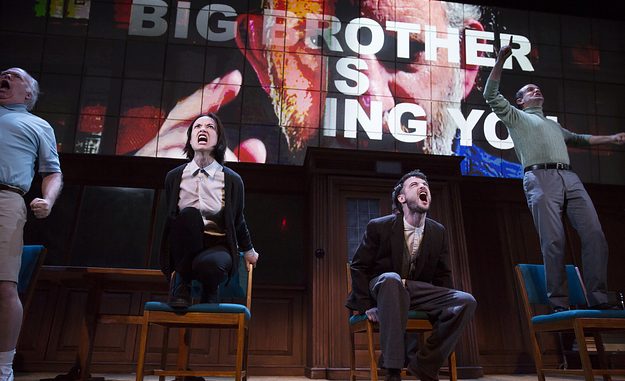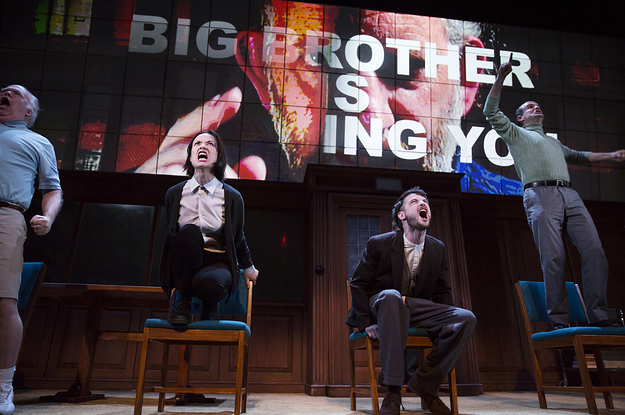

Julieta Cervantes
Olivia Wilde, Tom Sturridge, and the cast of 1984.
Most of the time, audience members leaving a play in the middle is a sign of failure. But the cast and creative team behind 1984 see their walkouts as a sign they’re doing something right.
It’s not that they want you to leave the show before it’s over; it’s that the play, which opened on Broadway’s Hudson Theatre in June, is a deliberately harrowing experience — they know not everyone can make it through all 101 minutes. If you’re squirming in your seat, or compelled to bolt for the nearest exit, 1984 has done its job. Like the rats that the play’s hero, Winston (Tom Sturridge), fears above all else, the production gets under your skin.
“It’s a totally justified response to leave,” Sturridge told BuzzFeed News from his costar Olivia Wilde’s dressing room backstage at the Hudson. “That is a totally logical and fair response to seeing something that deeply upsetting, and we condone it.”
In this production of 1984, everyman protagonist Winston is aged down from his usual middle-aged portrayal in adaptations of George Orwell’s classic novel. In the dystopian world of the play (and the book before it), Winston works for the Ministry of Truth, where his job is to revise history to conform to the totalitarian Party’s version of events. When he meets and falls in love with Julia (Wilde), they join the Brotherhood and embark on a path of resistance against the Party and its mythic leader Big Brother.
The play, co-created and directed by Robert Icke and Duncan Macmillan, hews closely to the novel — not just in terms of plot, but with a style meant to reflect the experience of reading it. Icke and Macmillan have conceived of a thrilling, disorienting production in which the audience is forced to depend on a relentlessly unreliable narrator. This 1984 doesn’t shy away from the dark climax of the story, which sees Winston and Julia captured and brutally tortured. And while the production does hold back when it comes to the most graphic mutilation, it is, at times, an unbearably confronting experience, leading some audience members to flee.
“We did absolutely want to make the audience feel anxious in the way that the novel makes you feel anxious,” Icke said. “We always felt we would have failed catastrophically if the audience wasn’t unsettled in the same way as people who read the book for the first time. We really wanted the production, like any good thriller or horror movie, to engender in the audience real fear.”
When the actors hear and see the visceral reactions from the audience — even if, yes, at times, that means actual cries of alarm or people shuffling loudly in their seats — Wilde noted that means they’re paying close attention.
“Their energy totally dictates ours,” Sturridge said. “And this production in particular allows for a level of interaction that is different.”
Wilde smiled before adding, “Some of them get blood on them.”
Julieta Cervantes
Winston (Sturridge) in the midst of his torture, with Reed Birney as O’Brien.
It’s not just what’s onstage that makes 1984 such a distressing experience — it’s the real-world anxiety that audience members are bringing into the theater. The play unnerves because it speaks to our most pressing fears, even if the words themselves are decades old.
Projection particularly plays a major part in the heightened reactions to the play’s torture scene. It’s indeed ghastly, but carefully timed blackouts obscure the worst parts. The clever trick makes audiences feel like they’ve seen far more than they actually have, as some of 1984’s more frenzied reviews indicate. In the New York Times, Ben Brantley wrote, “The interrogations that Winston undergoes in the play’s second half are graphic enough to verge on torture porn.” That’s a curious description for a play that’s less violent than some productions of King Lear, let alone a Saw movie.
“If this was all science fiction, we wouldn’t have an emotional response.”
“Almost everything is left up the audience’s imagination, which is a far more dangerous and terrifying realm than on the stage,” Sturridge said. “We’re not enacting things that I think are gratuitous. What’s gratuitous is the audience’s mind.”
It’s purposefully unpleasant to watch, of course, just as it’s difficult to read about in the novel. Including it in the play was essential in order to stay true to the source material. “The book has way more torture and way more explicit descriptions of violence than we portray in our show,” Macmillan said. “If we didn’t try and attempt to stage some of that, it would be our squeamishness about that imposing itself on Orwell’s story rather than trying to put Orwell’s story on stage.”
Macmillan explained that their reference points were not horror movies but rather real-world atrocities like Guantanamo Bay and Abu Ghraib. And that might be why some audience members are so disturbed by it: What they’re imagining when the lights go down isn’t just colored by the movies they’ve seen, but by the images of actual torture they’ve been exposed to over the years.
“The reason, unfortunately, that we can imagine so many of these horrible things is because we know that they’re happening in real life, right now, and that’s what we’re being faced with,” Wilde said. “If this was all science fiction, we wouldn’t have an emotional response to it.”
Julieta Cervantes
Winston (Sturridge) and Julia (Wilde) meet secretly with O’Brien (Birney).
This production, of course, is being performed under the Trump administration, and for many on the left, concerns about government censorship and the propagation of lies have reached a fever pitch. It’s no coincidence that in January, Orwell’s 1949 novel jumped to the top of best-seller lists.
“When Kellyanne Conway used the term ‘alternative facts,’ she seemed to be speaking out of the Party playbook in Oceania,” Macmillan said. “This is a term that you can use from the White House. Facts can have an alternative.”
There’s a direct line between the “alternative facts” of an inauguration crowd size and the Party’s declaration that when it says so, “2 + 2 = 5.” 1984 has remained relevant for nearly 70 years, through wildly different presidencies — but when audience members see their fears played out onstage, that can be a terrifying experience.
“There’s nothing that’s happening in the production that isn’t also happening in reality.”
“Every age sees itself reflected,” Wilde said, quoting a line from the play and its source material. “It is something that you could feel a connection to no matter what era you were in. I think now more intensely than ever we’re feeling that connection — certainly in this country, certainly me.”
But 1984 is not about Donald Trump, and this particular production originated years before the current administration was in the White House. When it premiered at England’s Nottingham Playhouse in 2013, Macmillan said it felt prescient then, too, thanks to Chelsea Manning, WikiLeaks, and the NSA revelations. “It felt like we’d somehow tapped into a political and ideological zeitgeist,” he said.
That wasn’t intentional — it’s just that when it comes to 1984, he and Icke would wager, there’s always good timing. They could have staged this same production under an Obama presidency or a theoretical Hillary Clinton presidency, he said, without changing anything. “It’s the strength of Orwell’s novel that I think there’s probably never been a time since it was published in 1949 that you could read this book and not think, Oh my gosh, you’re speaking directly to me,” Macmillan said.
Because of that, Icke and Macmillan didn’t change the play to make their production more expressly about Trump. For one thing, they weren’t looking to make a political statement, but they also knew audiences would immediately make a connection to Trump’s America without any prodding. Unlike the Public’s controversial Shakespeare in the Park production of Julius Caesar, which overtly linked the titular character with Trump, the creators of 1984 eschewed, as Macmillan cheekily suggested, depicting Big Brother “with a blonde wig and a long red tie.”
Julieta Cervantes
Party members engage in Two Minutes Hate.
Ultimately, the extreme response to this 1984 reflects the extreme climate it’s being presented in. As Wilde put it, “People are feeling a lot of intense emotions right now in this country, and a lot of rage, a lot of passion. And they’re looking to art to contextualize it.”
If 1984 is the scariest show on Broadway, that’s because, for many in the audience, the world is scarier than it’s ever been. And the lingering dread it instills in its viewers comes from the knowledge that leaving the theater — whether during the performance or after it’s over — won’t change that.
“There’s nothing that’s happening in the production that isn’t also happening in reality somewhere else in the world,” Macmillan said. “If [seeing this play] is the most shocking thing, if this is the most offensive thing that you’ve experienced that day, then you’re not really paying attention.”
Louis Peitzman is a senior entertainment editor for BuzzFeed News and is based in New York. Peitzman writes about and reports on theater, film, and television. Contact this reporter at [email protected].
Contact Louis Peitzman at [email protected].
Got a confidential tip? Submit it here.

